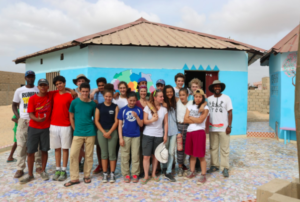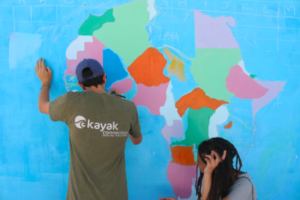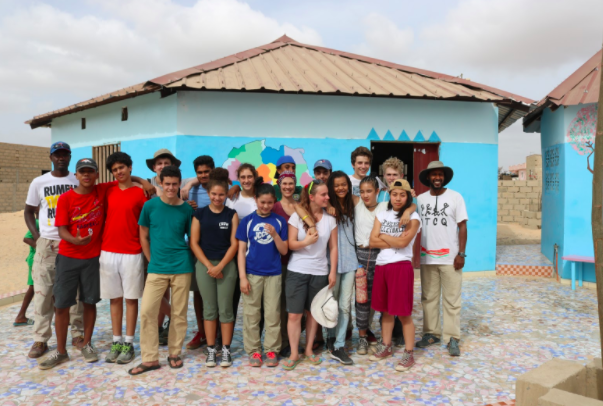On June 6th, 2017, after months of preparation and a 20 hour flight, a contingent of 16 students, two teachers from Lick-Wilmerding, two group leaders, and four teachers from the Bay Area Teacher Training Institute (BATTI) arrived at Léopold Sédar Senghor International Airport in Dakar, Senegal. The purpose of their journey was to continue a service project, started by their Lick peers last year, of building, in conjunction with the villagers, a new school in the village of Ndiokhob Guedj, Senegal.

The students, chaperones,and some of the local children gathered outside the completed classrooms
photo by Youssou Fall
During the winter and following spring at Lick- Wilmerding, in preparation for the trip, both the students and teachers who would go to Ndiokhob Guedj, designed their summer projects, gathered materials and attended multiple orientation meetings taught by Papp Sow, a Bay Area local, fluent in Wolof, the main language of Senegal. During these meetings, students and chaperones learned someWolof, Pular (the local dialect spoken at Ndiokhob Guedj), and French, to foster more communication between the volunteers and the villagers.
During these meetings, students split into groups and, in conference with the villagers in Ndiokhob Guedj, designed different items for the village. Some students prepared ideas in Rhino, a design so ware to create new tables, cupboards, benches, and desks, while others mapped out murals for the classroom walls. They also discussed the cultural expectations of their hosts and how to honor them. The students then talked about what they needed – or did not need – to take with them.
Before the flight, the students met up with a group of four teachers from BATTI who would accompany them on the trip. When the group of travelers left Dakar, they were ushered onto a small bus that took them into the village. Sofia Monfiglio ’19 describes their greeting in Ndiokhob Guedj, “We got on the bus and there was a giant crowd of all the little kids. They were so excited to see us. They were grabbing our hands and trying to talk to us, even before we had been introduced to them.”
Next the adult leaders of the community welcomed them and explained the schedule and the work ahead in the village.
After the first day, the students began to workon their respective projects. Each morning the students ate breakfast at their lodge, le Figuier, and then took a 30 minute bus ride into the village.
During the time of their stay, the village was fasting for Ramadan. After the day’s fast was broken, students sat down to eat with their families. Danika Claiborne ’19 discussed what a typical meal with their family was like, “In the evenings after work, after sundown, we would eat with our host families. Each night, we would break fast with them and eat from the huge communal bowl of fish, red rice, and cooked vegetables that they prepared for us.”
Each night, when the students ate with their host families, the families shared a lot about Senegalese language and culture. Aniket Joshi ’19 talked about his relationship with his Senegal host family, “For most people, there was a cultural difference between them and their family. My family, for example, was very traditional, as the men and the women ate separately.”
Youssou Fall, originally from Senegal, had chaperoned the Senegal trip in previous years, but this year only met up with the group during the day, and stayed with his family during the evenings. This was the first trip to Senegal for faculty members Erin Merk and Daniel Tesfai, who both teach Lick’s Body and Mind Education classes. Merk noted that she especially observed, “The level of responsibility given to the kids of the village and allowing them to have so many ‘adult’ duties. It wasn’t that it was surprising, it was just so different than here.”
Henry Stiepleman ’19 discussed the experience of being a visitor in the village, “People are much more friendly in other places then they are in America. Whenever we were driving or walking down the street, people would wave and say ‘hello,’ even if you didn’t know them.”
When the students arrived, the classrooms that had been built the previous year in conjunction with the villagers were bare and had few desks and benches. By the end of the trip, the Lick students had added new murals, desks, benches, windows, and doors to complete and furnish the classrooms. Next year, Lick students who participate in the Senegal trip will travel to the same village and continue the school project adding new playgrounds and more classroom space to the village.

Students finishing a mural outside the classrooms
photo by Omar Hutchins ’19






